project
The proposal to create the Intercontinental Academia was brought up during the meeting of the Steering Committee of Ubias (University-Based Institutes for Advanced Studies - a network between national institutes of advanced studies of 36 universities around the world), held in March 2012 at the Institute for Advanced Study Jawaharlal Nehru, in New Delhi, India. The initial idea was of the then director of the IAS of the Hebrew University of Jerusalem, Israel, Eliezer Rabinovici. The IEA-USP and the IAR (Institute for Advanced Research) of the Nagoya University felt motivated by the insight of the Israeli scientist and decided to be behind the pilot project for this initiative, which operates as a joint venture.
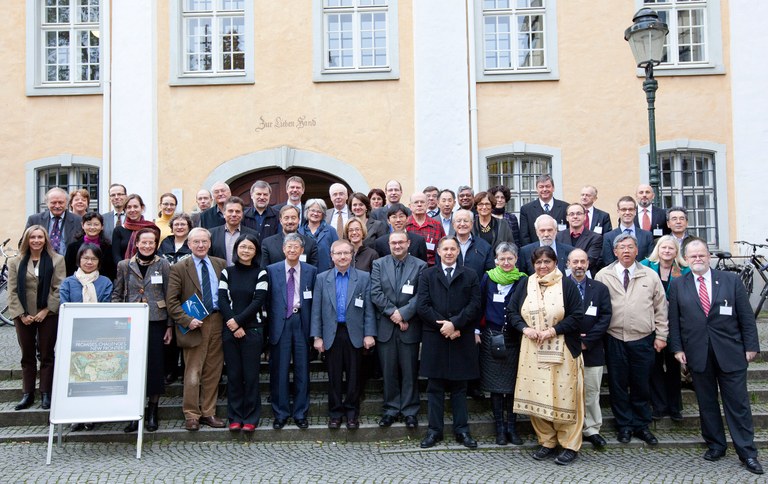 | 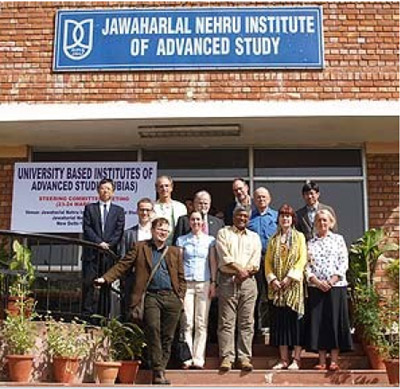 | |
|---|---|---|
| Foundation Conference in Freiburg, 2010. | The members of UBIAS's Steering Committee during the meeting in New Delhi, 2012. |
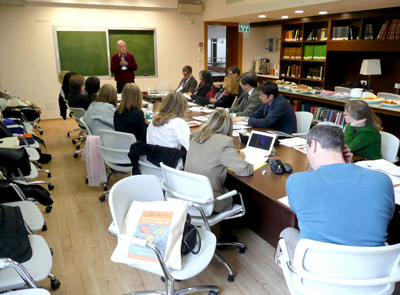 | 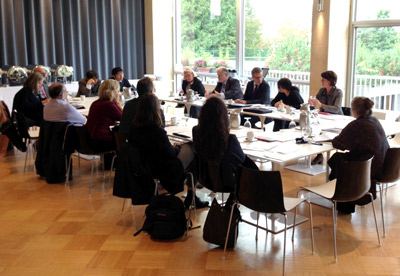 | |
|---|---|---|
| Eliezer Rabinovici, former director of the IAS of the Hebrew University of Jerusalem, speaks to the participants at the meeting of directors of the UBIAS network in March, 2013. |
Steering Committee Meeting during the international UBIAS conference in Vancouver, in September, 2013. |
The proposal is to promote scientific exchange between generations, disciplines, cultures and continents, investing particularly in young scientists aged between 30 and 40 years from different areas of knowledge to engage in an interdisciplinary collaborative study under the guidance of three senior scientists - of regional and international recognition - who should coordinate the activities. For this, 13 researchers from several universities that keep an UBIAS-member IAS on its chart have been selected.
Immersive meetings have been planned for the researchers to have the chance to discuss the researched topic through lectures, readings, workshops and discussions, besides sharing experiences, and participating in intercultural activities and social programme. The idea is that the exchange of information takes place not only among the selected participants, but also in their local scientific communities, offering contact to worldwide science, culture and research projects of excellence.
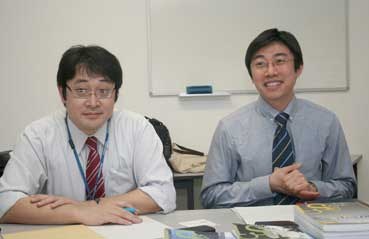 | 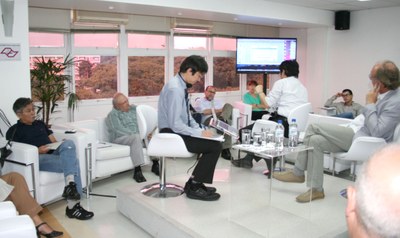 | |
|---|---|---|
| Professors Susumo Saito and Dapeng Cai, of the IAR-Nagoya, in two different moments of their visit to the IEA-USP in February, 2013. |
||
Each one of the 36 UBIAS-member IASs could indicate, on average, three names of high relevance among young researchers in their locality. From this group of approximately 100 names, 13 have been selected keeping the proposal to establish a mosaic of different areas of knowledge and nationalities.
The expectation of Martin Grossmann, director of the IEA-USP by the time of the selection process, was that the Intercontinental Academia would act as a laboratory for future university-level collaborative work. "It is a small-scale project, but has the potential to bring about a new format in higher education.” The term ‘academia’ may have a pejorative overtone, since it is used to refer to the body of great names in science who admittedly generated quality knowledge, but were uncommitted to transforming prevalent thoughts. “However, in the sense used at the Intercontinental Academia, the term refers to a cutting edge environment, an experimental space for discussions, risk-taking and fostering unexpected encounters,” he stressed.
According to Dapeng Cai, this type of initiative is very important because “university research is overly focused and specialized, and researchers fail to share languages, do not relate to other fields, and forget how to communicate with each other.” The economist noted that the Intercontinental Academia is guided by three goals: to stimulate joint research among Ubias members; to establish cooperation networks among the next generation’s scientific leaders; and to explore new forms of collective academic practices and new formats of scientific training, collaboration and dissemination.
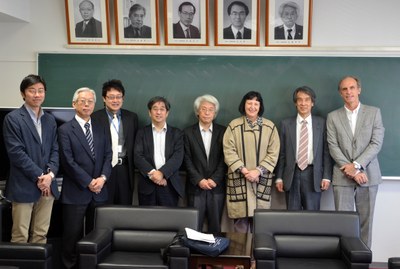 | 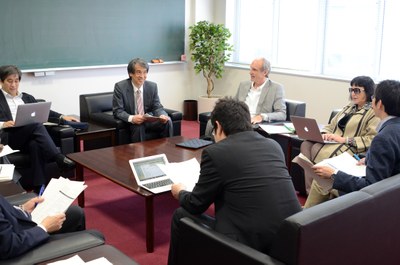 | |
|---|---|---|
| Professors Dapeng Cai, Shigeaki Zaima, Susumu Saito, Naoshi Sugiyama, Takao Kondo, Regina P. Markus, Takaho Ando and Martin Grossmann during the Planning Meeting of the Intercontinental Academia in Nagoya. April 23-27, 2014. |
Meeting in Science Building B at the Institute of Advanced Research of the University of Nagoya. |
From September 18 to 21, University of Freiburg's Institute for Advanced Studies (FRIAS) hosted the first meeting of the Intercontinental Academia's Senior Committee. It was attended by Takaho Ando, Takao Kondo and Dapeng Cai, all from the University of Nagoya, representing the IAR; Carsten Dose, Hermann Grabert and Bernd Kortmann, from the FRIAS, the last two being academic directors of the institute; Till Roenneberg, Eliezer Rabinovici (via Skype), Sami Pihlström (via Skype), Regina Markus and Martin Grossmann.
Over the four-day event, the group has made a series of workshops to proceed the planning of the Intercontinental Academia. The Senior Committee, formed by Grossmann, Markus, Kondo, Roenneberg, Rabinovici, Ando and Pihlström, has gathered to select the first names of young researchers to be part of the pilot project, to set the preliminary programme of the workshops in São Paulo and Nagoya, and to discuss possible results to be given by the Intercontinental Academia.
The young researchers have been chosen based on the analysis of their resumes and letters of motivation, considering two main guidelines: interdisciplinarity, and cultural and geographical variety. These criteria aimed to compose a group of plural scientists with potential to contemplate various disciplines, fields of knowledge, research traditions, countries and regions worldwide.
Among the decisions taken by the committee during the meeting, a new objective has been risen up. Besides the formation of international research networks, the development of cooperative research programmes and the publication of articles in renowned scientific journals, the Intercontinental Academia should create a Massive Open Online Course (MOOC) as an outcome of both immersion periods.
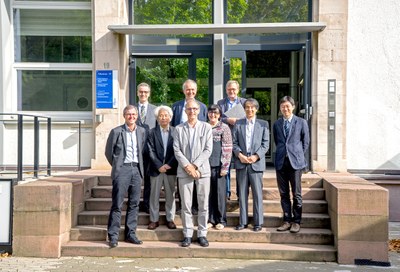 | 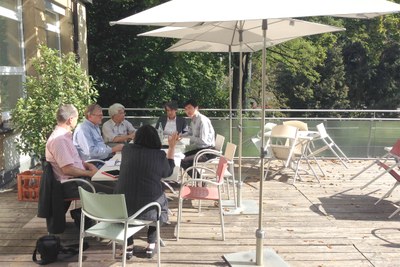 | |
|---|---|---|
| Carsten Dose, Hermann Grabert, Till Roenneberg, Bernd Kortmann, Takao Kondo, Martin Grossmann, Regina Pekelmann Markus, Takaho Ando and Dapeng Cai. |
Regina Pekelmann Markus, Carsten Dose, Till Roenneberg, Takao Kondo, Takaho Ando and Dapeng Cai. September, 2014. |
The Senior Committee gathered again during the UBIAS Directors Meeting in Taipei, from November 27 to 29. The primary purpose of the meeting was to resume the second and final stage of the selection of 13 particpants. In September, only 10 names were chosen. In order to ensure the formation of a plural group, composed of scientists from different continents, countries, cultures and academic traditions, the decision on the other five participants was postponed until there was time for newcomers to sign up. In Taipei, the leaders came to an agreement on the appointment of three new names linked to the Nanjing University (China), the Waseda University (Japan) and the National Taiwan University, host of the directors' meeting.
The second group of selected candidates has intensified the participation of researchers from East Asia, increasing the representation of science and Eastern culture in the initiative. These efforts concluded the selection process in the first half of February, 2015.
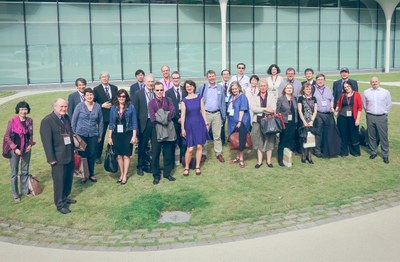 | 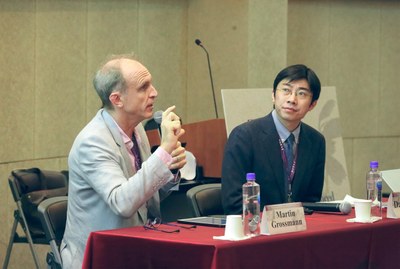 | |
|---|---|---|
|
Group foto during the UBIAS Directors Meeting in Taipei. |
Martin Grossmann and Dapeng Cai speaking about the Intercontinental Academia. |
The first phase of the Intercontinental Academia in São Paulo gathered more than 30 lecturers from the fields of anthropology, philosophy, neurobiology, chronobiology, physics and biology in April, 2015. They have presented papers to ample discussions on “Time,” the unifying theme of the entire project. Eight critical rapporteurs have been in charge of elaborating a scientific report on the whole event. The whole programme can be checked out here.
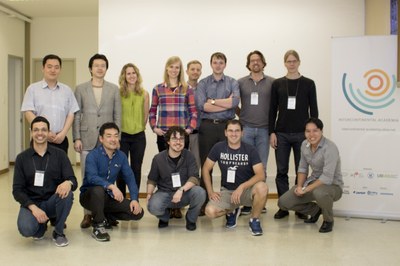 | 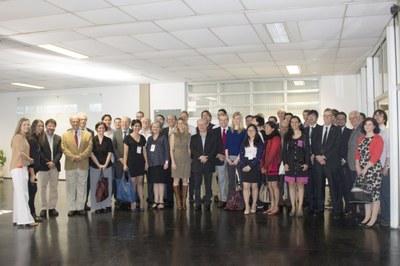 | |
|---|---|---|
|
The 13 participants of the Intercontinental Academia in São |
Group photo with Renato Janine Ribeiro, Brazilian Minister of Education in 2015. |
Senior committee members and young researchers met in November 2015 for an interim workshop. Held seven months after the first meeting in São Paulo, the meeting in Munich enabled the participants to advance the discussions and studies being conducted virtually since May, and to plan activities for the meeting in Nagoya in March 2016. The workshop has taken place at the headquarters of the Centre for Advanced Studies of the Ludwig-Maximilians Universität (LMU) and had the support of the Freiburg Institute for Advanced Studies (FRIAS). The meeting was intended to discuss the work carried out from May to November by the young researchers; to present and define the program of activities for the meeting in Nagoya; to think of the details of the MOOC that will be produced by the young researchers; and to discuss the partnership with Coursera.
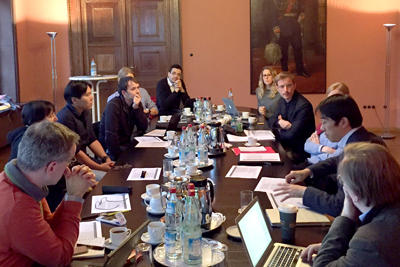 | 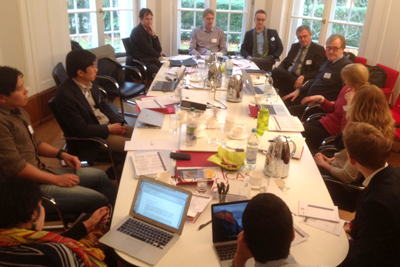 | |
|---|---|---|
|
Senior committee members and young researchers gathering |
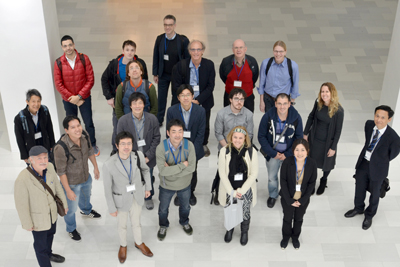 | 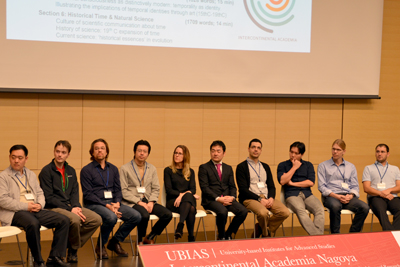 | |
|---|---|---|
|
The participants of the Intercontinental Academia in Nagoya. |
Final presentation. |
The filming of the online course prepared by the participants of the first edition of the Intercontinental Academia (ICA) was held in March 2017, in Ubatuba, at the "Clarimundo de Jesus" Research Base of USP's Oceanographic Institute (IO). The group of 13 participants is being represented by David Gange, from the University of Birmingham; Eduardo Almeida and Helder Nakaya, both from USP; Nikki Moore, from Rice University; and Valtteri Arstila, from the University of Turku.
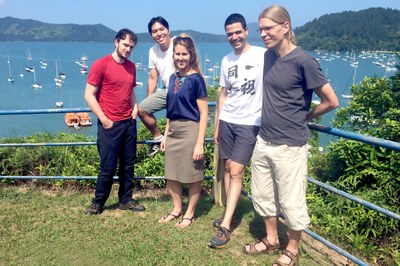 | 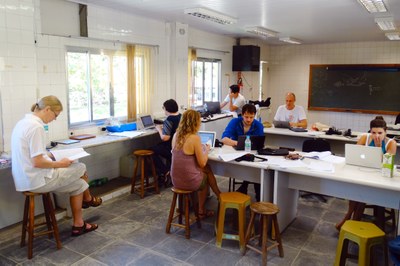 | |
|---|---|---|
|
The participants of the Intercontinental Academia in Ubatuba. |
Rehearsing before the filming. |
